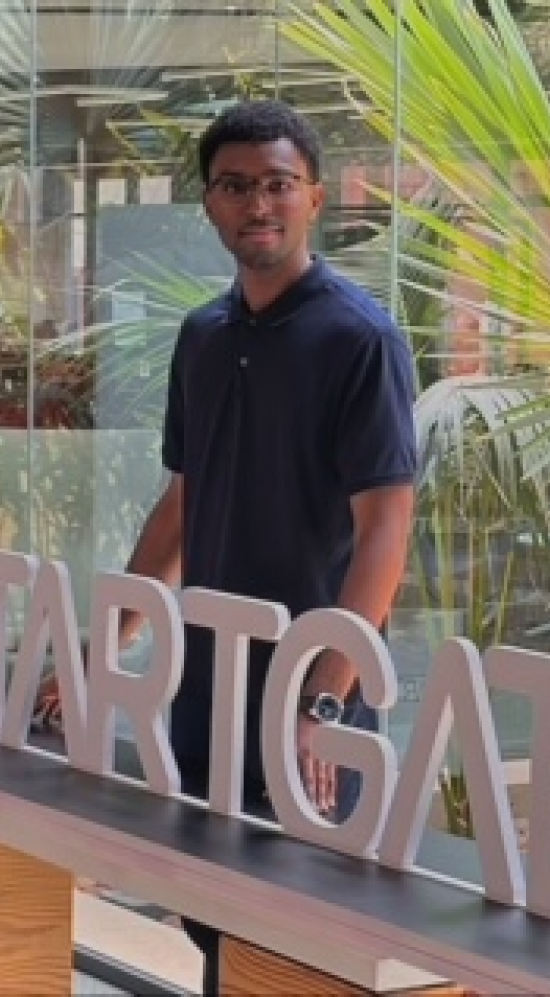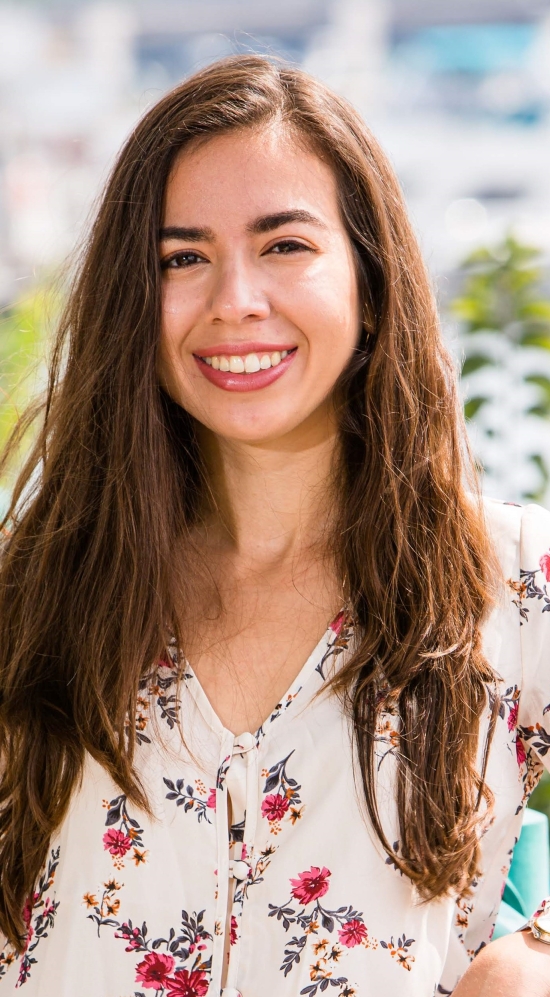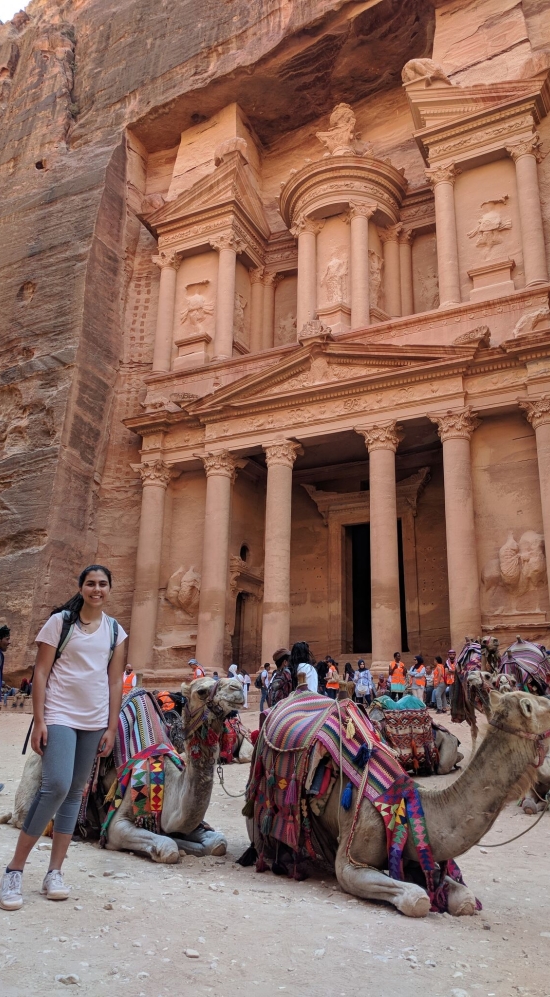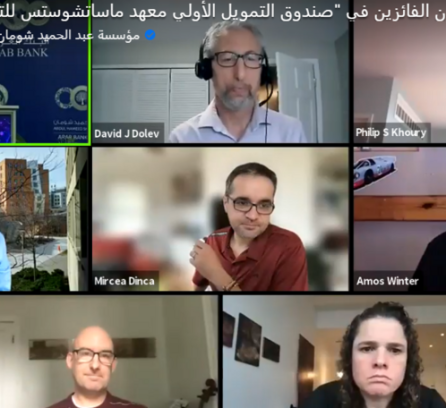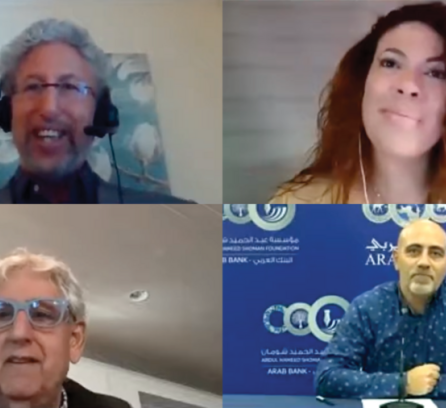The MIT-Arab World Program empowers MIT students and faculty to collaborate with partners in the region to solve some of today’s most pressing challenges. The program has activities in the following locations: Jordan, Bahrain, Morocco, and the U.A.E. This list may expand in the future.
Program Opportunities
Internships
MISTI’s award-winning international internship program provides a one-of-a-kind, world-class experience for MIT students: the opportunity to gain real-life work experience in leading companies and labs around the world. Best of all, all expenses are paid, including airfare.
The MIT-Arab World Program matches MIT students with internship and research opportunities at leading companies, research labs, and universities in specific countries in the region. Students complete intensive training prior to their internships, including courses on the host country's history, politics, and culture. Currently, internship opportunities in Jordan, Morocco, and UAE are open for applications, and plans are to extend them to additional countries in the region.
The MITdesignX Dubai (MDXB) accelerator is the MIT Morningside Academy for Design venture accelerator, created in collaboration with the MIT- Arab World program (MISTI Arab-World). It is led by staff and faculty from MIT, together with local partners Dubai Integrated Economic Zones Authority (DIEZ), Dubai Silicon Oasis (DTEC), and Global Growth Hub (GGH). The aim of the accelerator is to jumpstart and deploy new startups in the MENA region in the field of climate change and sustainability. It includes opportunities for MIT students to take part in internships in the accelerator ventures.
Apply here for Dubai Accelerator IAP 2025: applymisti.mit.edu
- Students must have a minimum of 4.0 GPA
- Students must take a course on the Middle East
Course Requirements:
One of the following courses is required. Other relevant courses taken in previous years may be applicable.
Fall Semester
- 4.614: Building Islam
- 21H.262: Palestine and the Arab -Israeli Conflict
- 21h.260: Cities in the Middle East: History, Politics, and Society
- 17.568: Comparative Politics and International Relations of the Middle East
- Three credit research paper with Professor Peter Kraus
Spring Semester
- 21H.260: The Modern Middle East
- 21H.365: Minorities and Majorities in the Middle East
- 3.993: Archeology of the Middle East
- SP.258: Middle East Cross-Border Development and Leadership
- Three credit research paper with Professor Peter Kraus
* Final project on country of placement is required.
*Preference will be given to students with proficiency in Arabic.
Applications for Summer 2025 can be found on the MISTI Portal. First, complete your Launchpad Application.
- Complete the MISTI Launchpad Application – November 1st, 2024.
- Interview with the Country Program Coordinator
- Complete MISTI MIT-Arab World Application- December 1st, 2024
- Commit to MIT-Arab World Program – By January 30th, 2025
- Internship matching process – February to April
- Mandatory Pre-Departure Sessions – Late March to Early May
TBD
Global Teaching Labs
Learn through teaching. GTL challenges MIT students to synthesize and present what they know, work in a team, and communicate with peers of a different cultural background, all while sharing MIT's unique approach to science and engineering education with high school students around the world. GTLs are often thematic and offered in several country options per IAP.
Through the MISTI Global Teaching Labs program, MIT students become teachers for one month over IAP in January. Students have the opportunity to travel to specific countries in the region to teach a variety of subjects, including a variety of STEM topics, entrepreneurship and leadership, and 3D printing. Students bring MIT’s unique and exciting hands-on teaching approach to high school classrooms.
To be eligible to participate, students must have a minimum 4.0 GPA, submit a MISTI application and complete an interview.
Students will be selected based on the following criteria:
- Knowledge of subject matter
- Adaptability
- Leadership ability
- Communication skills
- Interest in/experience with teaching
- Interest in the host country
- Fit with team/program
- Oct: Pre-selected students are invited to interview shortly after application deadline.
- Nov - Dec: Students selected to participate will attend pre-departure trainings.
- Jan: Most GTL programs take place during the last three weeks.
- Feb: Students attend a mandatory re-entry session upon return.
- Bahrain:
American University in Bahrain:
- Introduction to fabrication of interaction devices (input and output): Using digital fabrication tools (3D printers, laser cutters, etc, and novel materials for interaction-based fabrication), 3D modeling using Fusion360, introduction to digital fabrication, EE (circuit design, fundamentals of capacitive and resistive sensing), coding with Arduino and python, and potentially using Processing (a JAVA tool) to build software interfaces.
- Final Project: An interactive system with input/output device using novel materials (like conductive 3D printing filament, etc.) that are fully built and programmed by students
- Skills required from MIT students: Fabrication skills: 3D printing, laser cutting, hand tools
- Electronics skills: Arduino + familiarity with sensors + input/output devices + circuit building and debugging (using multimeter and oscilloscope). One member must be an expert in EE (i.e., background in electrical engineering) and comfortable with fundamentals of sensing technology-- predominantly capacitive and resistive
- 3D modeling: Comfortable 3D modeling with Fusion360
- Programming: Familiarity with programming with Arduino (C++) and Python. Knowing processing /Java is a plus.
- Business Accelerator: an interactive workshop and project-based learning where MIT Arab World students collaborate with AUBH students on the critical stages of startup development, including:
◦ Ideation and Validation: Collaborating with students to identify promising business ideas and assess market potential.
◦ Business Model Development: Guiding in creating sustainable business models aligned with market demands.
◦ Fundraising and Investment: Offering insights into securing capital for startup expansion.
◦ Scaling and Growth: Sharing strategies for extending market reach and achieving sustainable success.
◦ Final Project: Presenting their ideas to a review committee. - Skills required: a solid background in business and a passion for teaching.
- Riffa Views International School (RVIS):
Mastering the Future: Unleashing the Power of Automation with Robotics
Skills required: Arduino / C++: Strong proficiency in Arduino programming and good experience integrating sensors and actuators with Arduino. Electronics: Experience in designing and building electronic circuits and soldering. 3D modeling: Fusion 360 Additionally, instructors should be familiar with the following components that may be used in the projects: Motors and Controllers: ○ Stepper motors ○ Servo motors ○ DC motors with encoders ○ Motor drivers and controllers, such as TB6600 and Dual H Bridge L298n Sensors: ○ Ultrasonic sensors ○ Infrared sensors ○ Line follower sensors. Microcontrollers: ○ Arduino Mega ○ Arduino UNO ○ Arduino Nano. AI Vision module: Object recognition
Autobot Challenge: Engineering Autonomous Vehicles
Skills required: Arduino / C++: Strong proficiency in Arduino programming and good experience integrating sensors and actuators with Arduino. Electronics: Experience in designing and building electronic circuits and soldering. 3D modeling: Fusion 360 Additionally, instructors should be familiar with the following components that may be used in the projects: Motors and Controllers: ○ Stepper motors ○ Servo motors ○ DC motors with encoders ○ Motor drivers and controllers, such as TB6600 and Dual H Bridge L298n. Sensors: ○ Ultrasonic sensors ○ Infrared sensors ○ Line follower sensors. Microcontrollers: ○ Arduino Mega ○ Arduino UNO ○ Arduino Nano. AI Vision module: Object recognition
AI Vision Quest: Shaping the Future with Python and Computer Vision
Skills required: Advanced Python skills: Strong proficiency in Python programming. OpenCV expertise: Experience with the OpenCV library for computer vision projects. Raspberry Pi knowledge: Ability to integrate Raspberry Pi with various sensors and actuators.
- Powering the Future: Advanced Electric Car Engineering with Green Energy: This program covers all aspects of car engineering, including design, mechanics, chassis, electronics, gears, smart boards, and the car body. Students will also learn how to use solar panels to recharge their cars.
Skills required: Basic knowledge of physics, electronics, programming, and CAD software. Advanced students in Mechanical Engineering, preferably graduate students, are preferred.
https://www.youtube.com/watch?v=aVWirRZZ9R8
https://youtu.be/BHnCiomtbUE?si=xybTkBFQg1vX0oQi
2) Morocco
- Climate and sustainability program: Students with an interest in climate and sustainability are expected to draft a three-week curriculum and the final project.
- Healthcare and data program: Students interested in healthcare must draft a three-week curriculum and the final project.
3) UAE, Abu Dhabi
- Climate and sustainability with healthcare focus: The MIT Policy Lab and the Knight Science Journalism Program at Khalifa University in Abu Dhabi. The students will be subject matter experts for a science journalism workshop on climate change and public health. They will engage with international journalists and influence international media coverage of climate change and public health. Ideal candidates will be solid verbal communicators with demonstrated expertise in climate science, mitigation, adaptation, public health, or related topics and possess a collaborative aptitude and cultural sensitivity.
4) Jordan: Introduction to fabrication of interaction devices (input and output): Using digital fabrication tools (3D printers, laser cutters, etc, and novel materials for interaction-based fabrication), 3D modeling using Fusion360, introduction to digital fabrication, EE (circuit design, fundamentals of capacitive and resistive sensing), coding with Arduino and python, and potentially using Processing (a JAVA tool) to build software interfaces.
- Final Project: An interactive system with input/output device using novel materials (like conductive 3D printing filament, etc.) that are fully built and programmed by students
Skills required from MIT students: Fabrication skills: 3D printing, laser cutting, hand tools
- Electronics skills: Arduino + familiarity with sensors + input/output devices + circuit building and debugging (using multimeter and oscilloscope). One member must be an expert in EE (i.e., background in electrical engineering) and comfortable with fundamentals of sensing technology-- predominantly capacitive and resistive
- 3D modeling: Comfortable 3D modeling with Fusion360
- Programming: Familiarity with programming with Arduino (C++) and Python. Knowing processing /Java is a plus.
Global Seed Funds for MIT-Arab World
MISTI's Global Seed Funds program supports MIT's global engagement by promoting collaborations between MIT faculty and researchers and their counterparts abroad.
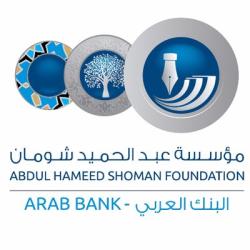
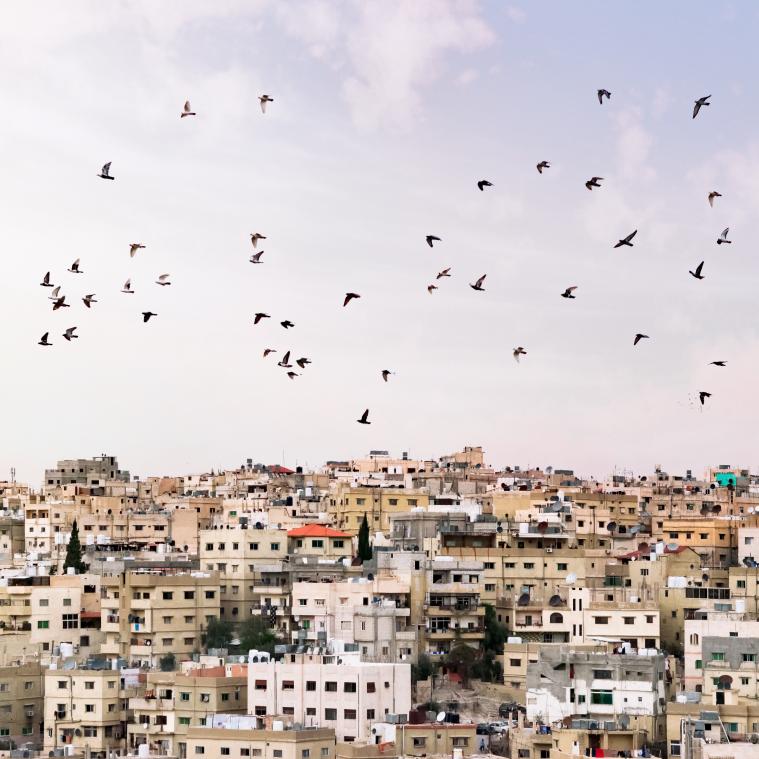
The MIT-Jordan Abdul Hameed Shoman Foundation Seed Fund
The MIT-Jordan Abdul Hameed Shoman Foundation Seed Fund supports new collaborations between faculty and research scientists at MIT and their counterparts in Jordan.
Meet the Program Coordinator
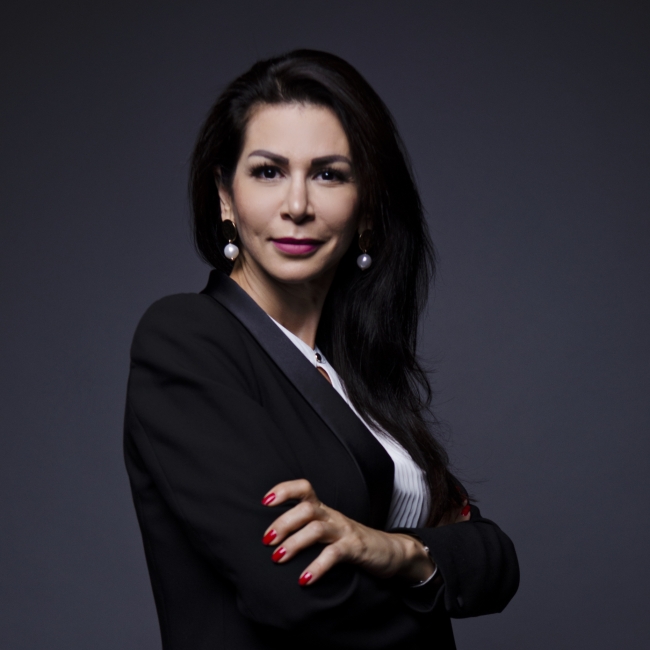
Get in touch with Maye Elqasem, Program Coordinator of the MISTI MIT-Arab World Program, to get your questions answered.
Meet the Managing Director

Get in touch with David Dolev, Managing Director, MISTI programs in the MENA Region, Senior Associate Director of MISTI to get your questions answered.

